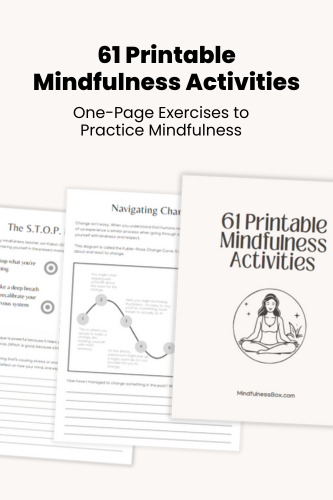Here’s a hard-won truth that, once you experience it for yourself, can save you some serious headaches:
You can’t always trust your thoughts.
Knowing when not to trust your thoughts is a skill. Cultivating this skill can save your relationships, improve your sanity, and generally make life easier.
Get dozens of one-page exercises to help practice mindfulness, meditation, gratitude, and self love. Perfect for printable handouts when teaching mindfulness to groups, students, or in the workplace.
To see examples, plus a full list of the 61 exercises included, click below.
But first—aren’t you supposed to trust our gut?
That’s what I thought too.
The problem is, sometimes your inner dialogue produces the thoughts of an absolute raving lunatic.
When you’re looking at the world through the prism of anger, jealousy, or even hangry-ness, you often have no clue that your thoughts are distorted.
Yung Pueblo said it much more poetically than I can:
To paraphrase:
- When you’re calm and peaceful, you’re probably seeing the outside world relatively accurately.
- When your mind is experiencing tension, you project that tension onto everything else you’re thinking about. And usually, you have no clue you’re doing this.
To avoid projecting your mental tension onto others, one approach is to spend more time in the “calm and peaceful” zone through techniques like mindfulness and meditation.
But this takes time.
How to Stop Projecting Feelings
Mindfulness and meditation can help with the projection of your emotions.
But if you’re looking for a quicker method for:
- How to stop projecting anger
- How to stop projecting insecurities
- How to stop projecting onto your partner
…then there’s another approach you can pursue in tandem.
1. Notice When Your Thoughts Are Turning Negative
Consider doing this:
Train yourself to notice when you’re experiencing tension. Then, ask yourself if your mental state might be affecting your judgment.
The most emotionally intelligent people I’ve met have this in common:
They know when their mind is affecting their thoughts. One of the wisest things you can do is acknowledge when you’re not at 100% and act accordingly.
“It’s been a hard day, so I can’t make a decision about that right now.
Can we talk about it tomorrow?”
2. Turn Your Focus Towards Yourself
Start by simply noticing when your inner turmoil is starting to project onto your thoughts, actions, and the people around you.
In my case, I notice myself getting easily frustrated by things that, under better mental circumstances, I’d deal with better:
- Traffic
- Waiting in lines
- My dogs barking
Then, I’ll notice myself projecting that tension onto others: onto my dogs for barking too much, for example, or onto the other people waiting in line ahead of me. (How dare they!)
Once I’ve reached this point, I can sometimes (not always) realize that I’m the problem—not them.
My dogs are barking because they’re dogs.
People are ahead of me in line because they also have errands to run.
3. Put Your Mind In “Time-out”
The temptation here is to feel like I can rationally talk myself into a new mental state. But that’s not usually how emotions work. Sometimes, you just have to ride them out.
That’s why my first approach to this problem is:
- Notice that I’m projecting
- Recognize my thoughts are distorted
- Divert my attention to something else
Here’s what that would look like in the “waiting in line” example:
I’m experiencing mental tension, and start getting frustrated by a long line at the bank. I convert that frustration into anger at the people waiting in front of me. Noticing I’m projecting, I see that my emotions are distorting my thoughts. To avoid going down an irrational rabbit hole, I do my best to shut my brain off and put my attention on something else for a while (a breathing exercise, a podcast, music).
This strategy works best if your “diversion activity” is something that has the potential to naturally shift your mood—going for a run, for example, or phoning a friend.
Who Wants to Be A Millionaire references aside, the idea is to buy yourself some time to allow your emotions to run their course.
The Power of Calling It Out
Most of our mental tension ends up projecting onto the people you interact with the most: family, friends, coworkers.
With people you trust, you might try another strategy:
Calling out your mental tension.
What does this look like?
It can be as simple as giving an honest answer to the question, “How are you?” Instead of saying, “pretty good,” try going a little deeper with something like “I’m actually feeling a little off today.” With the people you’re closest with, you can call out the specific emotions you’re experiencing.
Don’t underestimate the relief this can provide.
- You don’t have to pretend you’re okay when you’re not.
- The people around you don’t have to worry they’ve done something wrong when they haven’t.
Sometimes, I find that calling out my tension diffuses it almost immediately.
Noticing Tension Isn’t Failure—It’s A Sign of Progress
Sure, it’s not fun to realize you’re walking through the world with tension. It can feel like whatever work you’re doing for yourself—meditation, yoga, mindfulness training—isn’t really “working.”
But it is.
Noticing your tension is a sign of progress.
And if you’re able to notice it in time to prevent projecting your mental tension onto others, that’s a huge win—for you, and for them.

My mindfulness practice kicked off in 2016 with a ten-day silent retreat. Since then, I’ve read dozens of books about mindfulness and completed hundreds of hours of meditation. Thinking about what makes humans happy, calm, and peaceful is endlessly fascinating to me.


